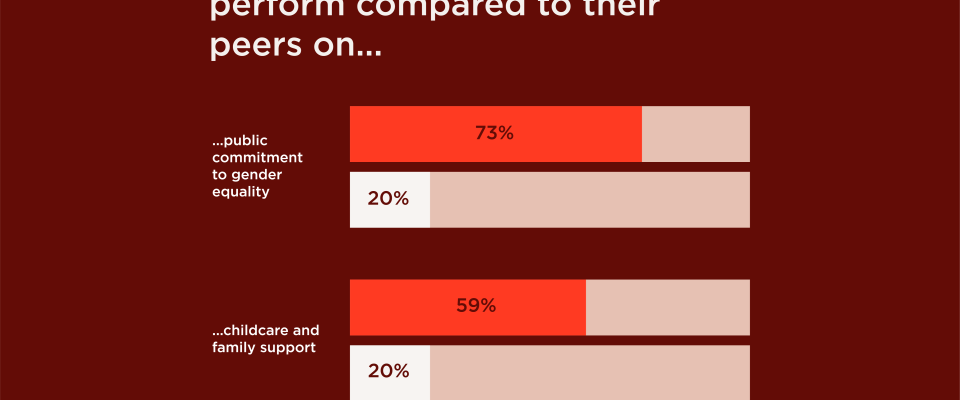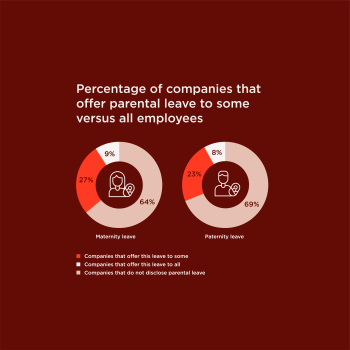Key finding
Top companies outperform their peers in public commitments to gender equality and addressing unpaid care

While the results from our assessment show that all 1,006 companies have a long way to go to reach gender equality, there are two key areas where the top 100 companies perform far better than the rest: making a public commitment to gender equality and women’s empowerment and addressing unpaid care via childcare and other family support programmes. These better performing companies can encourage their peers to ensure that women in the workplace are set up for success.
A company committed to gender equality recognises its responsibility to respect women’s rights and takes appropriate strategic action to achieve gender equality. Nearly three-fourths (73%) of the top 100 companies in the assessment have made a public commitment to gender equality and women’s empowerment, compared to only 20% of the bottom 906 companies. This commitment can be seen as a first step to set the tone from the top, helping establish gender equality as a priority for the entire company and not only relegated to Diversity, Equity, & Inclusion teams.
Though many of the policies and practices in place to ensure gender equality is embedded in the company are bottom-up, the Gender Dimensions of the Guiding Principles on Business and Human Rights state that companies should express their commitment to gender equality through a publicly available statement from the highest level. One way companies make this high-level public commitment to gender equality is by having their CEO sign the Women’s Empowerment Principles (WEPs). Of the 257 companies that publicly commit to this agenda, many of them (86%) do so by becoming a WEPs signatory. Public commitments may appear to be an easy way to take a stance on issues like gender equality, though they can also make companies more susceptible to scrutiny by allowing stakeholders to hold them accountable to walk the talk.
Another area where the top 100 companies in the assessment perform significantly better than the bottom 906 companies is in providing childcare and other family support. More than half (59%) of the top-performing companies provide childcare and family support while only 20% of the poorer performing companies do so. Every society needs care, whether for children, the elderly or people with disabilities, and women often disproportionately shoulder this responsibility. Women perform three-fourths of the total amount of unpaid care work compared to men. Those with caregiving responsibilities often face the dilemma of reducing their work hours or leaving the workforce entirely, which ultimately hinders progress on gender equality.
Companies could play a major role in helping alleviate the unpaid care obligations assumed not just by women but by all caregivers so that these tasks become a shared responsibility. One way of doing so is by providing flexible working arrangements to all employees. In 2020, the COVID-19 pandemic propelled many companies to implement remote work and flexible working hours. Today, it continues to be an available option in many workplaces and is another way to address unpaid care responsibilities. Flexible work is also an area where the top 100 companies outperform their peers. Three-fourths (75%) of the top-performing companies provide flexible working arrangements for their employees, while only 33% of the remaining companies do so. Flexible work grants employees the ability to have more control over when and where they work which often benefits women who are balancing their work and care responsibilities. However, only 2% of companies collect sex-disaggregated data on the number of employees who take advantage of these flexible working options – an important metric that could shed light on whether both men and women are using this arrangement, or whether women continue to disproportionately use flexible working arrangements and shoulder most of the care responsibilities.
There is something for all companies to take away from these results. Those outperforming their peers still have a long way to go, so it is important to continue focusing on the road ahead to reach gender equality. Those companies lagging can learn from these initiatives and make the necessary changes to ensure that they are walking on the path to gender equality, not just talking about it. Furthermore, while regional variations exist in overall performance in the assessment, companies from every region in the world are represented among the top 100 performers signalling that working towards gender equality in the workplace is possible everywhere.
